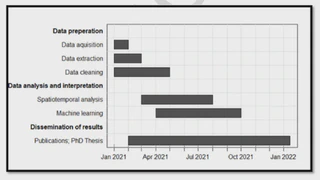Spatiotemporal epidemiology and forecasting of dengue in the state of Punjab, India: Study protocol
Dengue burden in India is a major public health problem. The present study has been designed to understand mechanisms by which routine data generate evidence. Secondary data analysis of routine datasets to understand spatiotemporal epidemiology and forecast dengue will be conducted. Data science approach will be adopted to generate a reproducible framework in the R environment. The lab-confirmed dengue reported by the state health authorities from 01 January 2015 to 31 December 2019 will be included. Multiple climatic variables from satellite imagery, climatic models, vegetation and built-up indices, and sociodemographic variables will be explored as risk factors. Exploratory data analysis followed by statistical analysis and machine learning will be performed. Data analysis will include geospatial information analysis, time series analysis, and spatiotemporal analysis. The study will provide value addition to the existing disease surveillance mechanisms by developing a framework for incorporating multiple routine data sources available in the country.
